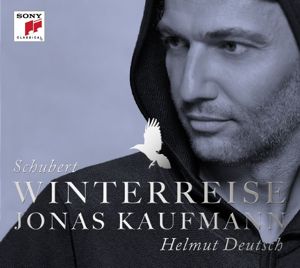 For
sheer vocal splendour, Jonas Kaufmann is unrivalled in Winterreise since Jon
Vickers, whose controversial 1983 recording is revelatory or grotesque,
according to taste. At moments – say, the clinching final phrase of each
verse of ‘Wasserflut’ – Kaufmann unleashes a formidable operatic blade of
tone. Yet the dominant impression of this deeply considered Winterreise is
of gentle, rueful introspection, momentarily flaring up in embittered
protest (forte high notes invariably bring a visceral thrill), then drifting
into trance-like resignation. For
sheer vocal splendour, Jonas Kaufmann is unrivalled in Winterreise since Jon
Vickers, whose controversial 1983 recording is revelatory or grotesque,
according to taste. At moments – say, the clinching final phrase of each
verse of ‘Wasserflut’ – Kaufmann unleashes a formidable operatic blade of
tone. Yet the dominant impression of this deeply considered Winterreise is
of gentle, rueful introspection, momentarily flaring up in embittered
protest (forte high notes invariably bring a visceral thrill), then drifting
into trance-like resignation.
In the booklet-note – fashioned as a
conversation between Kaufmann and pianist Helmut Deutsch – the tenor cites
the wanderer’s abiding death wish and his incipient insanity. In the closing
‘Der Leiermann’ (which ends with a sudden wail of anguish), he is ‘like a
madman talking to the ghost of a dead man.’ (Deutsch ventures to differ on
this.) On vocal evidence alone, though, he does not stress the disturbing
psychopathology of Winterreise as do fellow tenors Peter Schreier and Ian
Bostridge. Kaufmann begins ‘Gute Nacht’ with a chastened delicacy and finds
a melting pianissimo, devoid of irony, for the bittersweet final verse.
‘Erstarrung’, taken quite broadly, in response to Schubert’s autograph
marking ‘Not too quickly’, is nostalgically reflective rather than urgently
impassioned, rising to despair only at the final climax. Here and elsewhere
Deutsch’s clear, precise textures, plus the use of Schubert’s original high
key, brings dividends in the dialogues between voice and piano bass.
From the hallucinatory, half-whispered ‘Irrlicht’, Kaufmann’s wanderer
becomes ever more prone to numb reverie. The haunted ppp colour he finds for
the close of ‘Frühlingstraum’ is heart-rending. In ‘Im Dorfe’ he
contemplates the sleeping villagers with tenderness rather than derision,
and in ‘Im Wirtshaus’ suggests a deepening life-weariness, with no hint of
defiance in the last line. The final upshot is a profoundly touching winter
journey, one that conveys all of the wanderer’s pathos, vulnerability and
isolation. Schreier’s journey across the snowbound landscape is more
engulfing, a merciless portrayal of emotional and spiritual disintegration
that is only enhanced (in this cycle) by the astringent edge on his tone.
But Kaufmann’s combination of vocal beauty and verbal sensitivity (his
diction always a model), and the fastidiously textured and coloured playing
of Helmut Deutsch, make this new recording an important addition to the vast
Winterreise discography.
|